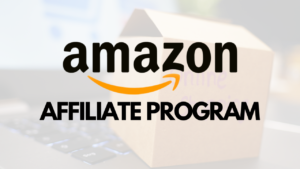Table of Contents
Introduction to SEO:
For every affiliate marketer driving traffic to a website, Search Engine Optimization (SEO) is something that you cannot do without if you want to succeed in your affiliate marketing business. SEO, simply put, is the process of optimizing your website to increase its visibility and ranking in search engine results pages (SERPs). In today’s digital landscape, where the majority of online experiences begin with a search engine query, SEO plays a critical role in driving organic traffic to your affiliate marketing website. By optimizing various aspects of your website, including content, keywords, and backlinks, you can improve your business’s online presence, attract more qualified leads, and ultimately, boost conversions. Now, let’s explore five top SEO tools that can help your affiliate marketing business achieve its optimization goals.
1. SEMrush
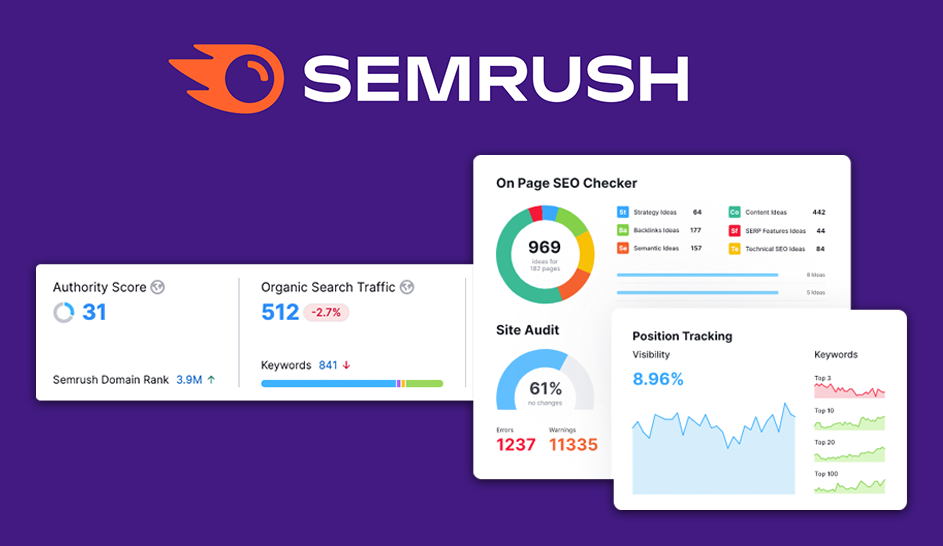
Pros:
- Comprehensive keyword research tools enable users to identify high-volume, low-competition keywords.
- In-depth competitor analysis provides insights into competitor strategies and opportunities for improvement.
- Robust site audit functionality helps uncover technical SEO issues and suggests actionable solutions.
- Social media tracking features allow monitoring of social media performance and competitor activities.
- Has a free trial.
Cons:
- Steep learning curve for beginners.
- Higher pricing tiers may be prohibitive for small businesses.
- Keyword database may not be as extensive as some competitors.
- Some features may be overwhelming for users who only require basic SEO functionalities.
Pricing:
SEMrush offers three main pricing tiers: Pro ($108.33/month), Guru ($208.33/month), and Business ($416.66/month) if you subscribe annually.
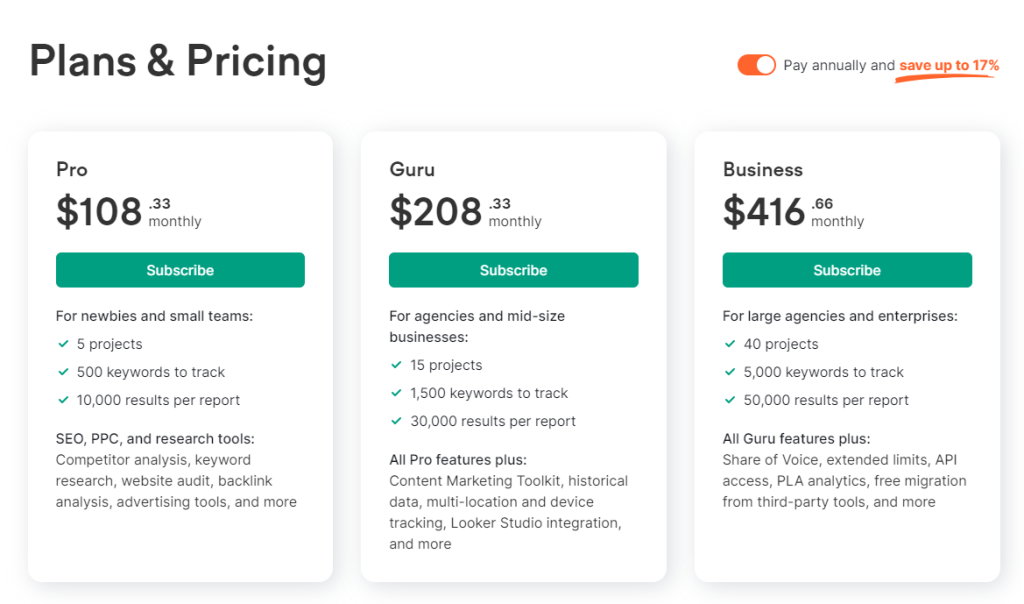
Special Features:
- Position Tracking: Monitor website rankings for target keywords and track changes over time.
- Backlink Audit: Identify and disavow toxic backlinks that could harm SEO performance.
- Content Marketing Toolkit: Plan, create, and optimize content for better SEO performance.
- Advertising Toolkit: Analyze competitors’ advertising strategies and optimize ad campaigns.
2. Ahrefs
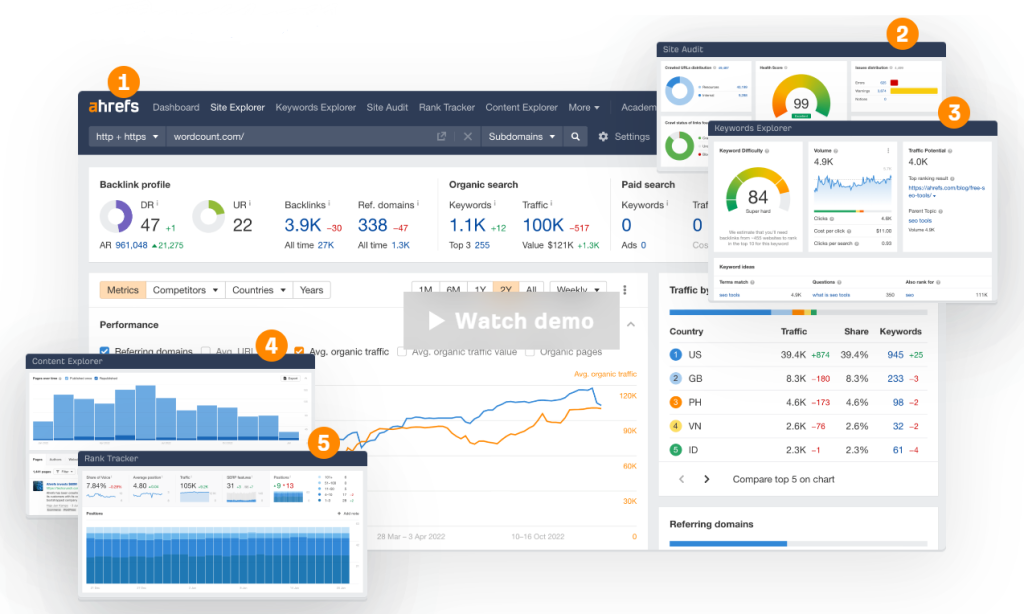
Pros:
- Extensive backlink analysis capabilities enable users to identify valuable link-building opportunities.
- Accurate keyword difficulty scoring aids in prioritizing keywords with the greatest potential for impact.
- User-friendly interface makes it accessible to users of all experience levels.
- Content Explorer feature helps discover top-performing content in any niche.
Cons:
- Relatively high cost compared to some competitors.
- Keyword tracking capabilities may not be as advanced as other tools.
- Limited to on-page and backlink analysis, lacking comprehensive site audit features.
- Some users report occasional discrepancies in backlink data.
Pricing:
Ahrefs offers four pricing plans: Lite ($99/month), Standard ($199/month), Advanced ($399/month), and Agency ($999/month).
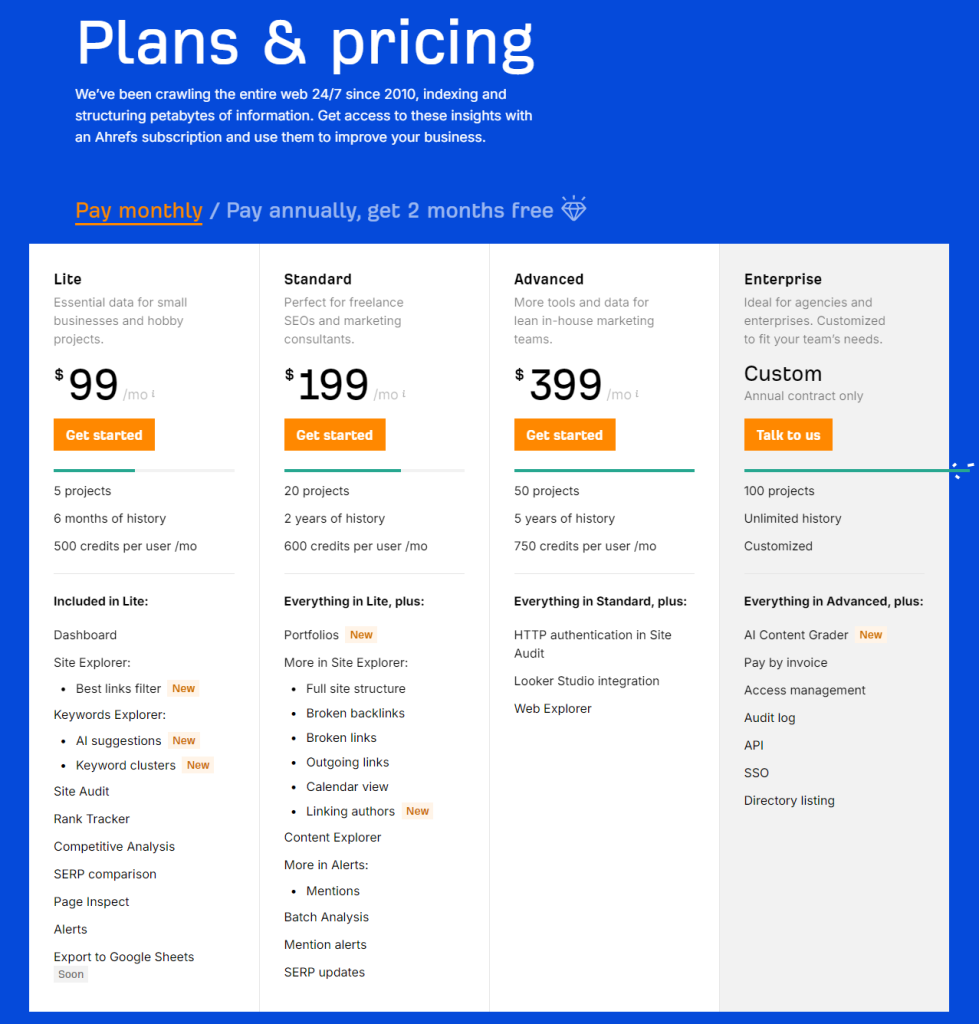
Special Features:
- Site Explorer: Gain insights into any website’s backlink profile, organic search traffic, and top-performing content.
- Rank Tracker: Monitor website rankings for target keywords and track progress over time.
- Content Gap: Identify content opportunities by comparing your website with competitors.
- SEO Toolbar: Access valuable SEO metrics directly from your browser while browsing the web.
3. Moz Pro
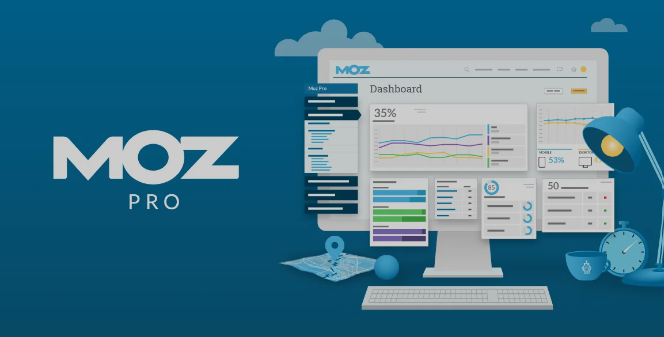
Pros:
- Comprehensive suite of SEO tools covers all aspects of SEO, from keyword research to site audits.
- MozBar browser extension provides on-the-fly SEO analysis, making it easy to assess the SEO performance of any webpage.
- Excellent customer support and a wealth of educational resources.
- Local SEO features help businesses improve their visibility in local search results.
Cons:
- Keyword difficulty scores can be inconsistent.
- Limited link index compared to competitors.
- Some users find the interface to be less intuitive compared to other tools.
- Pricing may be prohibitive for smaller businesses.
Pricing:
Moz Pro offers four pricing plans: Standard ($99/month), Medium ($179/month), Large ($299/month), and Premium ($599/month).
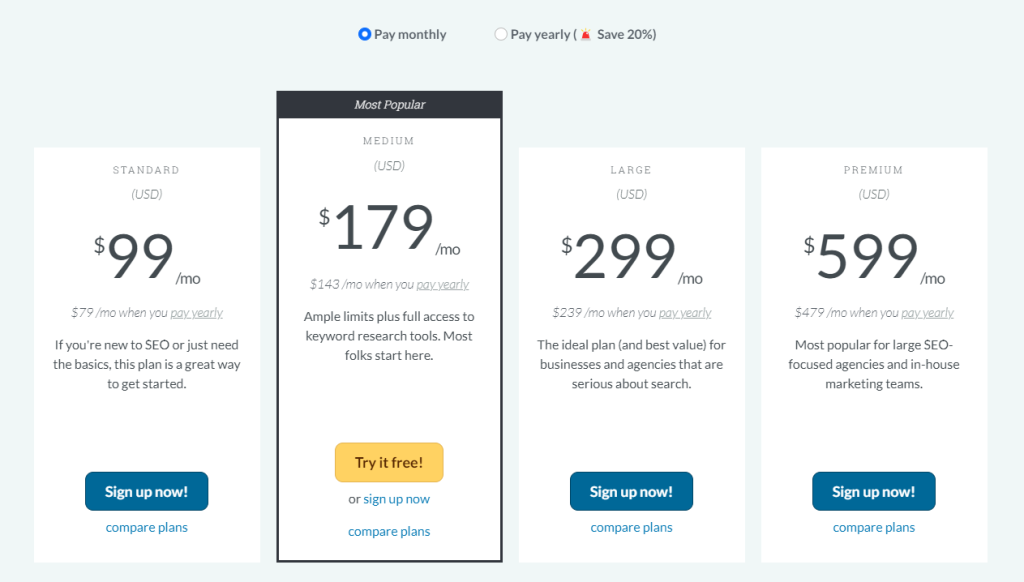
Special Features:
- Moz Local: Manage business listings across various online directories to improve local SEO.
- On-Page Grader: Analyze individual web pages and receive actionable suggestions for optimization.
- Keyword Explorer: Discover and prioritize keywords with accurate volume, difficulty, and opportunity metrics.
- Link Explorer: Analyze backlink profiles and uncover link-building opportunities.
4. Rank Math SEO
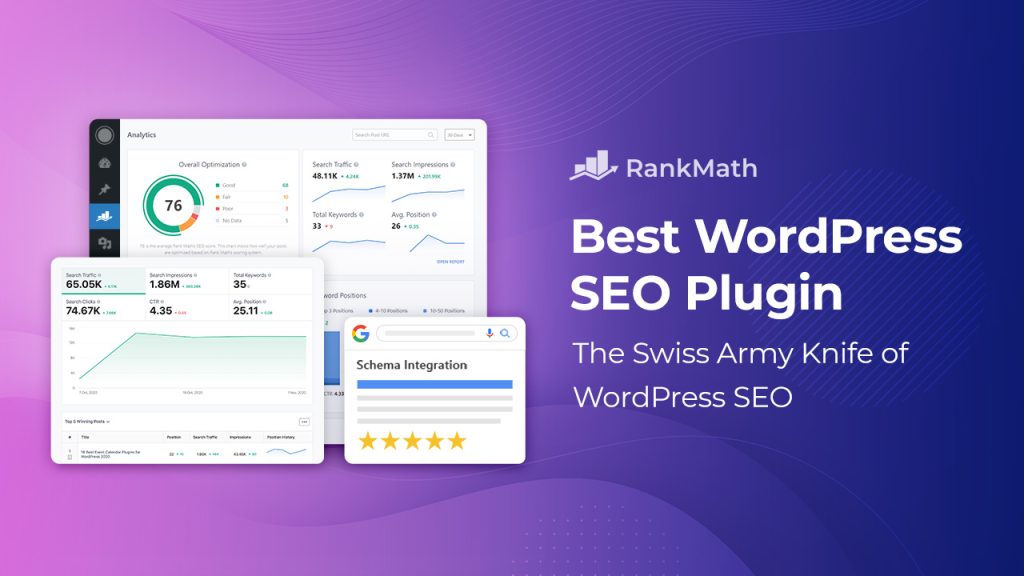
Pros:
- All-in-one SEO solution with a wide range of features.
- Easy setup and configuration with a user-friendly interface.
- Advanced schema markup options for enhanced search engine visibility.
- Built-in redirection manager for managing 301 redirects and fixing broken links.
- Has a free plan that you can start with and upgrade later.
Cons:
- Some users may find the interface overwhelming due to the abundance of features.
- Advanced features may require technical expertise to utilize effectively.
- Limited customer support compared to some competitors.
- Occasional bugs and compatibility issues with certain WordPress themes and plugins.
Pricing: Rank Math offers a free version with basic features. The Pro version starts at $7/month for UNLIMITED personal websites license.
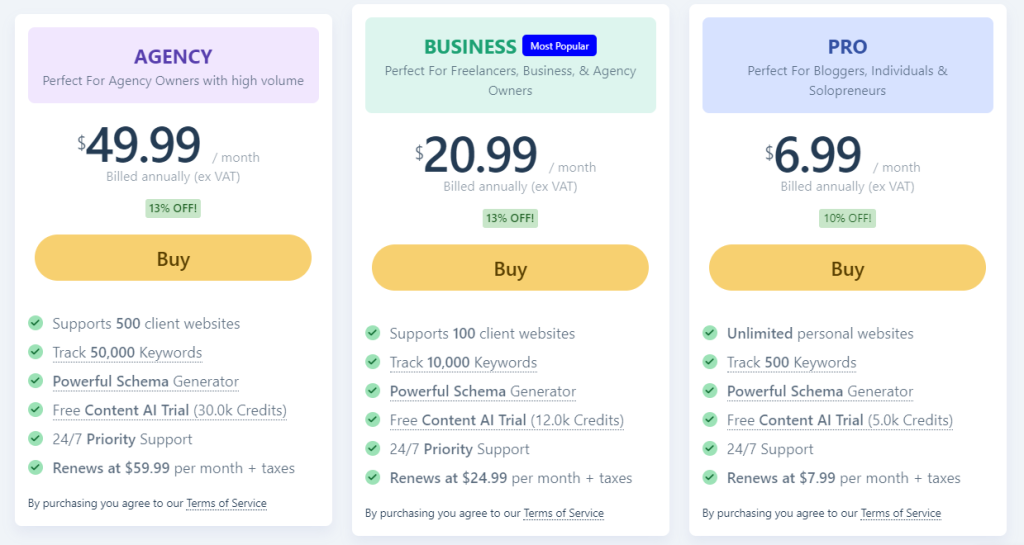
Special Features:
- Rich Snippet Support: Easily add schema markup to enhance search engine visibility and improve click-through rates.
- Keyword Rank Tracker: Monitor keyword rankings and track progress over time.
- Google Analytics Integration: Seamlessly integrate with Google Analytics to track website performance and user behavior.
- WooCommerce Integration: Optimize product pages and category pages for better visibility in search results.
5. Screaming Frog SEO Spider
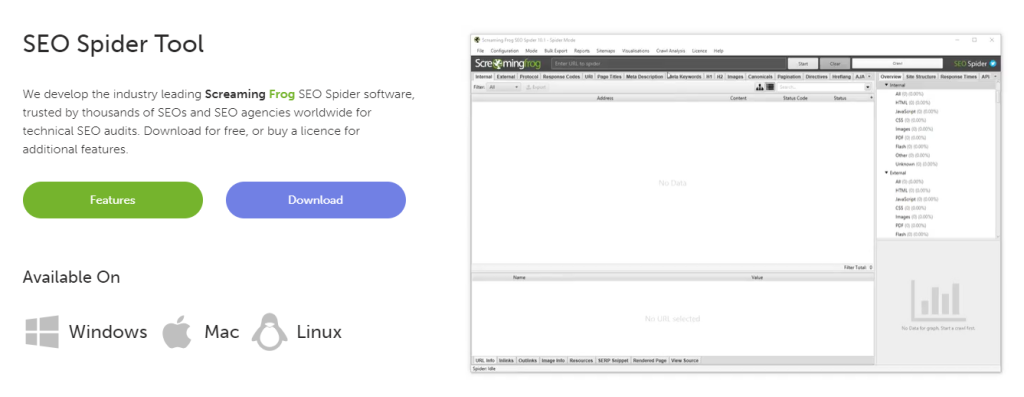
Pros:
- Powerful website crawling capabilities allow for comprehensive technical SEO analysis.
- Detailed insights into on-site issues such as broken links, duplicate content, and missing meta tags.
- One-time fee rather than a recurring subscription, making it cost-effective for long-term use.
- Custom Extraction feature enables users to extract specific data for advanced SEO analysis.
- Has a free plan that you can start with and upgrade later.
Cons:
- Interface can be overwhelming for beginners.
- Lacks off-site SEO features such as backlink analysis.
- Limited to on-site analysis, with no competitor analysis functionalities.
- Some users may experience performance issues with large websites.
Pricing:
Screaming Frog SEO Spider is available for a one-time fee of £199.00 (~$259).
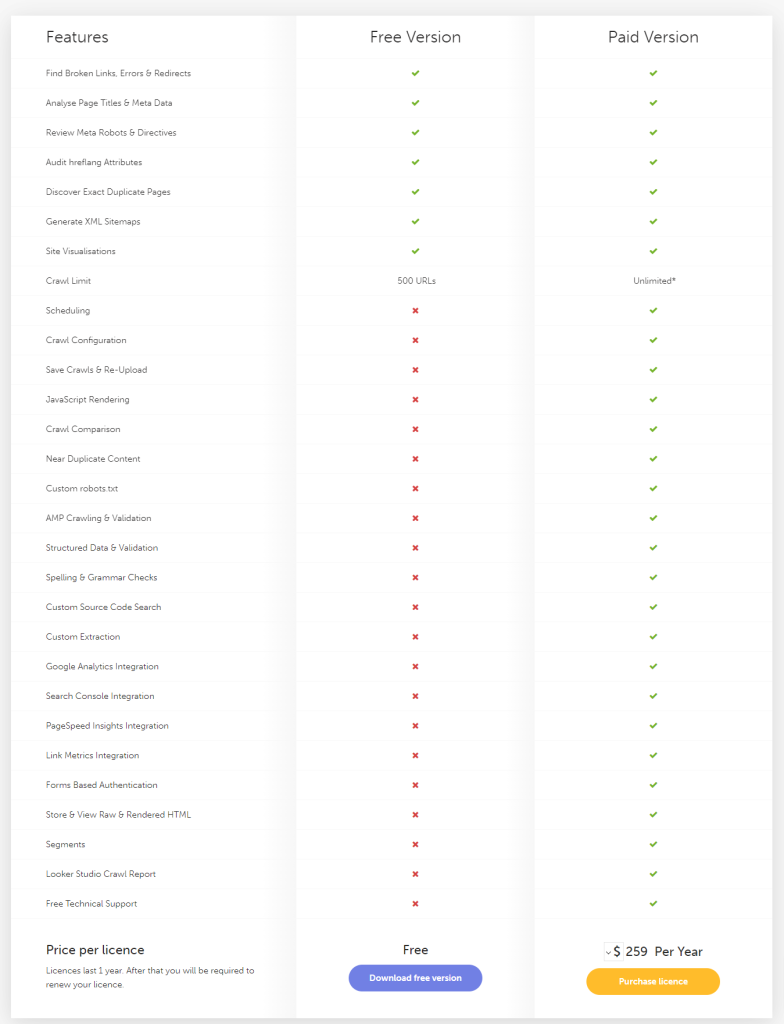
Special Features:
- XML Sitemap Generator: Quickly generate XML sitemaps to aid search engine crawlers in indexing websites.
- Custom Search: Configure custom search parameters to extract specific data from websites.
- PageSpeed Insights Integration: Integrate with Google PageSpeed Insights to analyze website speed and performance.
- Hreflang Attribute Checker: Ensure correct implementation of hreflang tags for international SEO optimization.
Bonus: Google Search Console
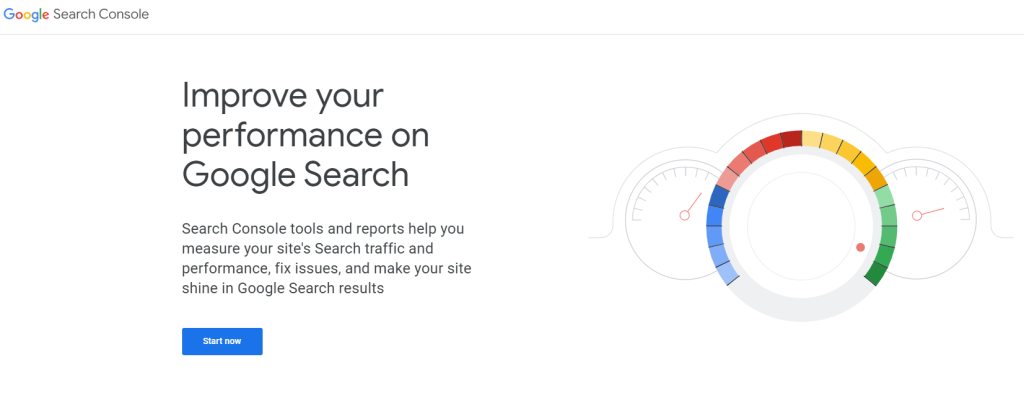
Pros:
- Free to use, making it accessible to businesses of all sizes.
- Direct insights from Google, the largest search engine, providing valuable data on website performance.
- Detailed performance reports for organic search traffic, including click-through rates and average position.
- Mobile Usability Report helps ensure websites are mobile-friendly, crucial for ranking in mobile search results.
Cons:
- Limited keyword data compared to third-party tools.
- No competitor analysis features.
- Data can sometimes be delayed or incomplete.
- Limited support and documentation compared to other tools.
Pricing:
Google Search Console is entirely free to use.
Special Features:
- Index Coverage Report: Identify and resolve indexing issues that may affect website visibility in Google search results.
- URL Inspection Tool: Debug issues and monitor the indexing status of individual URLs.
- Performance Report: Track website performance in search results, including clicks, impressions, and average position.
- Security Issues Report: Identify and address security issues that may affect website visibility and user experience.
In conclusion, choosing the right SEO tool depends on the specific needs, budget, and expertise level of your affiliate marketing business. Each of these tools offers unique features and functionalities to help you optimize your business website and improve its search engine rankings. By leveraging the power of these tools, you can gain valuable insights, identify opportunities for improvement, and ultimately, achieve your business SEO goals.



